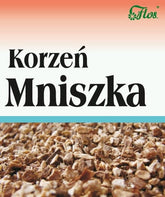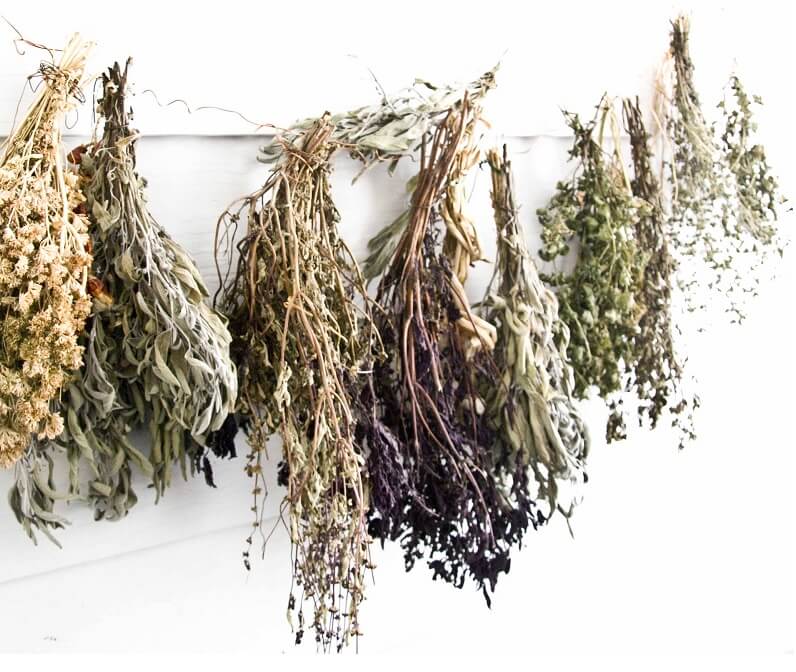Dried herbs or... – which should you choose?
CONTENTS
- What exactly are herbs?
- Occurrence forms of herbs and spices
- What kind of herbs should I use?
- Herbs for seasoning dishes – in what form?
- In what form are herbs healthiest?
- Herbs for various ailments
- Contraindications to the use of herbs
- Summary
The multitude of herbs available at the market and in your own garden can be overwhelming. It's generally assumed that fresh herbs are much more beneficial to our bodies. This truth cannot be denied. But let's take a closer look at this topic. Not everything in life is always black and white. Herbs and spices also hold many secrets and can be quite a surprise for some once they get to know them better. Did you know that the popular oregano is actually called marjoram and is closely related to marjoram? I don't know where oregano comes from, and this name has stuck with us for a long time.
What exactly are herbs?
There is no single definition of herbs. The most accepted approach is to treat them as plants, since they contain substances that affect the metabolism and function of the body. These include medicinal, aromatic, and poisonous species. This group includes primarily annual and biennial herbaceous plants, but also trees, shrubs, vegetables, and perennials. Some fungi are also included. Herbs are used in herbal medicine, aromatherapy, and as spices. In the past, they were obtained almost 100 percent from natural sources, which was unfortunately a nuisance. Today, however, they have become plants that are cultivated on a large scale. An interesting fact might be that Poland is responsible for almost 20 percent of the world's production of herbs and spices.
Occurrence forms of herbs and spices
Dried herbs are the most common, of course. This is due to the advantages of this form. Firstly, it makes storage and transportation much easier. Furthermore, in this form, even a small amount in a bowl or infusion is very noticeable. The drying process itself is also quite simple and efficient. During this process, herbaceous plants lose almost 90 percent of their water. This prevents them from rotting and makes them more resistant to infections by fungi or microorganisms. In industry, they can be additionally fixed using radioactive elements. This is especially true for spices. This method is called radiation fixation. Sound dangerous? Of course, there's nothing to be afraid of. Dried herbs and spices are irradiated with light. For example, cobalt isotopes are used for this. After this treatment, the shelf life is significantly extended, but we also remove microorganisms that can lead to accelerated spoilage of the product.
Then there are fresh herbs . These, for the most part, have the greatest health-promoting effects on the body. The downside is their shelf life, as they are not suitable for long-term storage. The answer to this might be freezing them. This is a beneficial form of storage, as they lose almost none of their beneficial properties during this process. Some of them, such as dill or parsley, are much easier to use then.
We can also distinguish all kinds of herbs pickled, pickled, or in oil. This is a form of long-term preservation that allows for longer storage. In this respect, they lose significantly less of their properties than when dried. We can distinguish between infusion and infusion. In the first form, the crushed herbs are poured with oil or olive oil and left to rest for 14 days. After this time, we obtain a flavored liquid that we can use as a seasoning or, for example, for rubbing. The situation is similar with infusion, except that here the solvent is concentrated ethyl alcohol.
What kind of herbs should I use?
The answer to this question isn't simple. It all depends on what we expect from the herbs and spices we use. It will be easiest to categorize it according to the form they can be used in. Let's distinguish between herbs for seasoning dishes that contain the highest nutritional value and are suitable for various ailments.
Herbs for seasoning dishes – in what form?
Fresh herbs are much more aromatic than dried ones, so it's worth having them in your kitchen, but it all depends on how they're stored. For example, a pot of a particular fresh herb bought from the supermarket won't be any more aromatic than its properly dried counterpart. Of course, fresh herbs have many other health-promoting compounds, but this can change when added to hot dishes. The nutrient loss of fresh herbs and spices under the influence of high temperatures is truly significant. If we choose to use them, it's worth using them at the very end of cooking or just before serving. This applies, for example, to parsley, dill, basil, or the popular oregano. These losses still occur, but not to the same extent as when added to boiling soup. Therefore, dried or frozen herbs have found much greater use in the kitchen than fresh ones. It's well known that it all depends on preference, and there will certainly be those who avoid dried herbs like the plague. It's worth noting that the latter are much more concentrated. Therefore, you should add about half as much as you would with fresh spices and herbs. With imported herbs, the situation changes dramatically. Then this dilemma virtually disappears. When it comes to spices from distant countries, we rely on dried ones, as fresh spices wouldn't be able to withstand the rigors of such a long journey.
In what form are herbs healthiest?
In this case, the answer is clear. Fresh herbs have the most beneficial effects on our bodies. They contain many essential oils and are also rich in flavonoids, beta-carotene, B vitamins, vitamin C, and minerals. They enhance the taste and aroma of food, regulate the digestive system, support metabolism, and facilitate digestion. The antioxidants contained in herbs have anti-inflammatory and anti-allergic properties. They also have a preservative effect. Therefore, they are often added to pickled cucumbers, cabbage, and marinated mushrooms. Fresh herbs also make an interesting kitchen decoration. You can grow herbs yourself without much effort. All you need is seeds and a small pot. You can also buy ready-made herbs, which you only have to take care of later.
Herbs for various ailments
Thanks to their rich health-promoting properties, they are also used medicinally. Fresh and dried herbs are best used in infusions or inhalations. Who among us hasn't tried an infusion of dried mint, chamomile, or sage? They can also be an interesting alternative to air fresheners or used in aromatherapy. Just a few drops of essential oil or herbal extract are enough to fill your home with a variety of pleasant scents.
Herbs enriched with oil or alcohol are used as lotions for rubbing on sore spots. They can also relieve inflammation in muscles and joints. They have a calming, relaxing effect, and help you relax more quickly. To some extent, they can also have a positive effect on restful sleep and help you fall asleep.
Contraindications to the use of herbs
Herbs and spices are relatively safe in small doses. However, there are certain physical conditions and illnesses where it's best to avoid overusing them. People with kidney and liver disease should be careful. Too many herbs and spices in the diet place a significant burden on these organs. This is because they are often involved in the metabolism of the substances contained in herbs.
Preparations and some medicines based on herbal extracts can cause side effects to the same extent as semi-synthetic or synthetic medications. Therefore, read the package insert or consult your doctor before use. The same applies to allergy sufferers and pregnant women. Women, in particular, should choose their products very carefully. Furthermore, the substances contained in herbs can interact with immunosuppressive, antidiabetic, or anticoagulant medications, for example. If you take medication regularly, you should also consult your doctor in this case.
Summary
Herbs and spices are Mother Nature's treasures. It's amazing how many beneficial properties they can bring. They are used in cooking, medicine, aromatherapy, and even in perfumes and cosmetics. Remember that wherever active ingredients are present, there is a risk of complications from overdose. Therefore, choose herbs carefully. Let them be a dietary supplement, not a miracle ingredient that conquers all ills.
THE PUBLISHER'S CHOICE
Dried plums 1 kg BIOGO
- €7,01
- €7,01
- Unit price
- / per
Dried White Mulberries 500 g ORGANIC
- €5,84
- €5,84
- Unit price
- / per
Almonds 1 kg BIOGO
- €11,69
- €11,69
- Unit price
- / per
Cranberries sweetened with apple juice organic 1 kg BIOGO
- €16,37
- €16,37
- Unit price
- / per
Dried dates 1 kg BIOGO
- €4,21
- €4,21
- Unit price
- / per
Unpeeled buckwheat groats 1 kg BIOGO
- €2,81
- €2,81
- Unit price
- / per
Walnuts 800 g BIOGO
- €8,65
- €8,65
- Unit price
- / per
Peeled sunflower seeds 1 kg BIOGO
- €3,04
- €3,04
- Unit price
- / per
PULLED ORGANIC SUNFLOWER SEEDS 1 KG BIOGO
- €4,44
- €4,44
- Unit price
- / per












































































































































